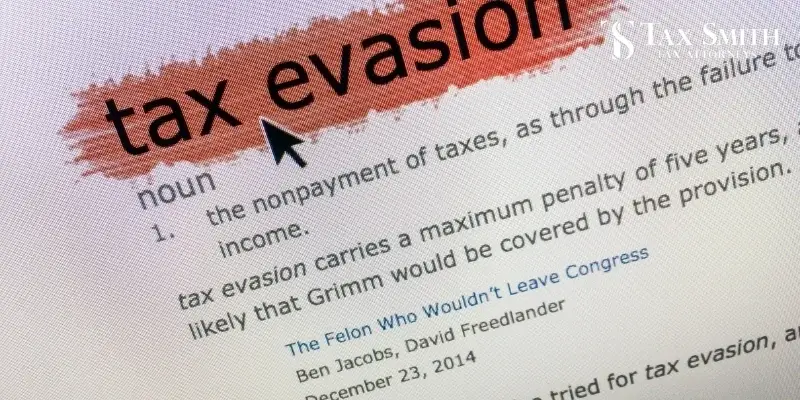1548 The Greens Way – Ste. 4 Jacksonville Beach FL 32250
What Is Tax Evasion in Florida?
Paying a large sum for taxes can be frustrating, whether it is because you no longer have dependents to claim or you are bringing in more income because the higher payment could create financial strain. It is easy to be tempted to find new ways to avoid paying such high taxes.

If you make a donation to your favorite climate change charity or set up your paycheck to automatically deposit money into a retirement account, you could get a tax deduction. Being intentional about these things can help you pay the least amount of taxes possible through a method called tax avoidance, which is perfectly legal. Tax evasion takes avoidance a step too far by using illegal methods like submitting financial statements that are not complete or even going so far as to bribe tax officials to not have to pay your taxes. If you have been charged with tax evasion, an experienced tax law team can help you navigate your case.
What Is Tax Evasion?
It is often expected for people to try and pay as little as possible when it comes to their taxes through processes like getting a tax credit for buying a home or a deduction for tuition. When the avoidance moves beyond simple steps into illegal territory, such as a business owner paying employees in cash under the table to avoid taxes, then it becomes tax evasion. Basically, tax evasion is anything that an individual does to avoid paying their taxes entirely. There are many things that can be considered tax evasion, like failure to file tax returns, so it is important to know how to identify it so avoidance does not become a crime.
Signs of Tax Evasion
Big names like Willie Nelson and Martha Stewart, who were collectively found guilty of nearly $17 million in tax evasion, often come to mind when the topic is brought up. The truth is, anyone can be charged with tax evasion if they are intentionally breaking the law simply to avoid paying taxes. This lawbreaking may come in the form of:
- Not reporting income if you run an all-cash business, like street vendors or babysitters
- Failing to report income from a rental property that is not in the United States
- Claiming more dependents on your tax return than you actually have
- Filing a frivolous lawsuit claiming that taxes are illegal or immoral
- Claiming false deductions on your taxes for a higher refund
Anyone can make a mistake on their taxes, but when it becomes a pattern, the IRS may suspect them of tax evasion and pursue charges. One of the biggest factors that is considered in a tax evasion case is intent. If someone incorrectly lists their income on a tax return, they will not automatically be arrested for tax evasion, but if failing to file taxes or not providing accurate information becomes a pattern, then they could face charges.
Penalties for Tax Evasion
Tax evasion is a serious crime that carries significant penalties, including fines, criminal charges, and jail time. When someone is convicted of federal tax evasion for creating false tax returns over several years, their penalties could be much harsher. They will likely be charged with a felony, have to pay a fine of up to $100,000, and spend five years in federal prison.

FAQs About Tax Evasion in Florida
What Are the Penalties for Tax Evasion in Florida?
If someone creates several offshore accounts to hold their money so they do not have to pay and evades $15,000 in back taxes, their initial penalty will be paying back every dollar. If the charge for tax evasion ends up being a felony, they could pay another $5,000 in fines and spend ten years behind bars if they are convicted. For example, if a business owner in Florida evaded $30,000 in taxes by claiming business credits they were not eligible for, they will be charged with a felony and could pay a $10,000 fine and spend up to fifteen years in prison.
What Are the Most Common Forms of Tax Evasion?
When someone does not pay their taxes for several years and is not caught, they may falsely assume that they will never be caught. However, they have committed tax evasion and could be charged with a felony. Similarly, a business owner who pays employees in cash could be guilty of tax evasion if they do it to avoid payroll taxes. Others could invest all of their assets in something they believe is not traceable or taxable, like Bitcoin or Monero, but be charged with tax evasion and face serious penalties.
What Is Considered Tax Evasion?
Making donations to your favorite charity to get a tax deduction or regularly contributing to your 401k are legal ways to reduce the amount of taxes you pay, called tax avoidance. Avoiding some taxes becomes a crime when you are knowingly breaking the law, sometimes by making fake tax returns or claiming a tuition credit you do not need, so you do not pay any tax at all.
What Are Signs of Tax Evasion?
Someone who claims more dependents on their taxes than they are actually responsible for could be committing tax evasion by trying to get an unfair tax credit. If you notice that your boss does not keep track of payroll or only pays employees under the table, that could be another sign of tax evasion. Knowing how to identify signs of tax evasion can help you avoid getting caught up in it accidentally.
If You Were Accused of Tax Evasion, Contact TaxSmith, LLC for Guidance
Someone who created offshore accounts to hide their assets from the IRS and not pay taxes could face heavy penalties, including fines of up to $100,000 and thirty years in prison. A guilty verdict for tax evasion charges can be daunting because it could eliminate any savings you had or cost you your freedom. An experienced tax attorney from TaxSmith, LLC can help you understand the details of your charges, what the penalties may be, and how to move forward. Contact our office today for assistance with your tax evasion case.
Locations We Serve
- Alabama
- Arizona
- California
- Colorado
- Connecticut
- Delaware
- District of Columbia
- Florida – HQ
- Georgia
- Idaho
- Illinois
- Indiana
REQUEST A CONSULTATION
Please fill out the Contact Request Form and a Tax Attorney/Paralegal will call you
to discuss legal representation or to schedule your free initial consultation




